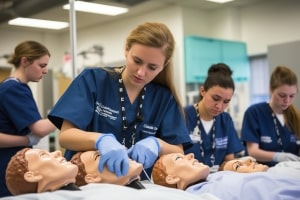
Earning a mortuary science degree can seem like a long and challenging road for those just getting started. After their education, graduates must also undergo apprenticeships, exams, licenses, and further education. The total time it takes to start working in funeral service varies based on multiple factors, including state-specific requirements, but an overview of what to expect combined with a premium educational program can help students and pre-professionals set themselves up for success.
This article reviews the details of beginning a career in funeral service, including a degree timeline and a brief guide for starting work in this challenging yet rewarding field.
What Is Funeral Service?
Funeral services are professional services provided in the care of the deceased and the support of their grieving families. The core roles in the field of funeral service include:
- Funeral Directors: These professionals coordinate funeral services, including arranging the venues, filing the proper documents, managing the logistics of the ceremonies, and providing grief counseling for families.
- Embalmers: This job entails preparing the body for viewing, including any aesthetic restorations needed or requested.
- Funeral Assistants & Arrangers: Assistants and arrangers support funeral home operations and serve client needs as a facilitator to the funeral director.
While some roles in funeral service require licenses, others do not. For example, most states require embalmers to carry a license, which requires a degree, apprenticeship, and board certification. However, some states, such as Colorado, do not require licensing. Individuals pursuing a mortuary science degree or other funeral service career path should check their state’s requirements based on the role they want.
Is Funeral Service a Good Career?
As populations grow, the demand for funeral services inevitably increases, making it a growing career field with a consistent demand. Professionals in funeral service often find it to be a rewarding field, finding a sense of purpose and career fulfillment by serving families in difficult times.
According to the Bureau of Labor Statistics, morticians earn an average of $51,030 a year (as of May 2023). Funeral service professionals also enjoy versatile career opportunities, as their experience can lead to many other professions, including restorative art, embalming, grief counseling, business ownership, marketing, and management.
The ideal candidate for a funeral services career is compassionate, detail-oriented, emotionally intelligent, and organized. They need to strike a balance between the study and practical applications of mortuary science and the art of compassionately caring for grieving families. Upward advancing in the field increases the opportunities for competitive pay, a flexible work schedule, and ample employment in most states.
How To Start Working In The Funeral Industry

A career path in the funeral industry may differ by state and individual requirements, but generally follows a pattern:
- Step 1: Earn a high school diploma or equivalent.
- Step 2: Enroll in an accredited Mortuary Science program (online or on campus).
- Step 3: Complete hands-on clinical hours (embalming, restorations, practical planning exercises).
- Step 4: Pass the National Board Exam (NBE) and any state-specific licensing exams.
- Step 5: Complete an apprenticeship or internship under a licensed funeral director or embalmer (duration varies by state).
- Step 6: Apply for licensure through your state board.
Mortuary Science Degree Timeline
These steps provide a basic outline, but depending on several factors, graduates in the funeral service industry may have a longer or shorter timeline. These factors include:
Program Length
This typically ranges from 16 to 36 months, depending on whether the student pursues full-time or part-time workload. At AAMI, for example, students can choose between flexible online and on-campus options with structured timelines to suit their needs.
Coursework
The subjects required to complete a mortuary science degree include anatomy, physiology, the psychology of grief, business law, embalming, restorative art, funeral directing, and more. The required coursework includes both academic learning and hands-on lab or practicum experience.
Required Practicum
The hands-on experience required to become a funeral service professional includes overseeing clinical embalming cases, participating in restorative art labs, and completing an in-person funeral directing practicum, which is also required for online students.
Total Time To Enter The Field
The time from starting a mortuary science degree to becoming licensed in the field of funeral services lasts roughly between 2 and 4 years. Depending on school and state resources, accelerated options may be available in certain situations.
Start Earning Your Mortuary Science Degree Today

A mortuary science degree is a career-focused path into a stable and respectable field. Funeral service professionals are required to know the science of their field and the art of compassion, as they work to organize and conduct funeral services while also fulfilling emotional duties for their grieving clients. The time it takes to get started may vary based on state requirements, but an accredited institution can set you on the right path.
AAMI supports student skill development at every stage of mortuary science education with rigorous yet flexible programs. Online and on-campus options provide personalization to make sure that students have a schedule that matches their professional and personal goals. Create an application or contact our team to learn how we can help you pursue a stable career in mortuary science today.
FAQs
How do I get into the funeral industry?
Education comes first, namely by earning a high school diploma or GED and enrolling in an accredited mortuary science program. After earning an associate degree, which is required in most states, graduates can progress to licensing and training, which includes completing clinicals and practicum hours, passing the National Board Exam (NBE), and fulfilling state-specific internship and apprenticeship requirements. After meeting these requirements, application can be made for state licensure to enter the industry as a funeral director, embalmer, or other role.
How expensive is mortuary school?
The average mortuary science degree program ranges from $10,000 to $25,000, depending on the school, location, and program length. Online programs, such as the one at AAMI, may offer savings and flexible schedules to help students pay for their programs in addition to financial aid, grants, scholarships, and payment plans. Additional expenses include books, embalming supplies, lab and exam fees, and required travel to complete clinicals.
How much do funeral services professionals make?
Funeral directors typically earn between $45,000 and $75,000 per year, while embalmers and funeral assistants may fluctuate in either direction. The factors that influence pay include location, the size of the funeral home, the professional’s experience level and certifications, and the responsibilities of the job. Business ownership, advanced roles, or specialization in smaller fields, such as restorative art, may bring higher income potential.
